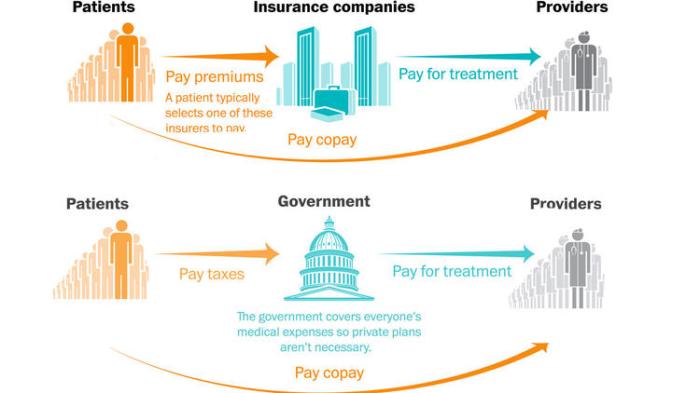As Republican efforts to repeal and replace the Affordable Care Act continue in the background, some Democrats are starting to eye a new health policy goal: implementing a single-payer system. Sen. Bernie Sanders, I-Vt., introduced a single-payer bill in mid-September with 16 Democratic co-sponsors — 16 more than he got when he introduced the bill two years earlier. But how is the health care system funded now, and how would “single-payer” change that?
How health care systems are funded
There are three major components to every health care system, single-payer or not: a patient, a payer (typically an insurance company or the government) and a provider. Here’s how money moves between them:
How multipayer systems work
Virtually all health care systems follow this general pattern, but who the payers are can vary widely. In the U.S. private insurance market, patients typically purchase coverage from one insurance company among many competing insurers. Because different people end up with different insurers, there are multiple payers throughout the U.S. health care system.
How single-payer systems work
In a purely single-payer system, there is, as the name would indicate, just one payer — typically the government. This is analogous to how the United States administers some portions of Medicaid: The government provides coverage, and no private insurers are involved.
Sanders’ bill takes universal coverage close to this extreme: The government insurance would cover so many services with such small copays that private insurance would be almost universally unnecessary. Accordingly, it would also be quite expensive — $32 trillion over 10 years, according to an Urban Institute report. That’s more than a 50 percent increase in federal spending — all federal spending — according to spending projections by the Congressional Budget Office. That would be partially offset by people no longer needing to pay premiums to private insurers, however, and the government’s monopoly could allow it to implement cost-saving measures.
Read More: http://snip.ly/mt3iy#http://www.chicagotribune.com/business/ct-biz-...

You need to be a member of MedTech I.Q. to add comments!
Join MedTech I.Q.